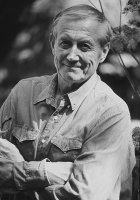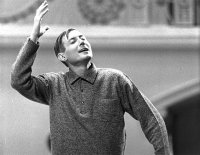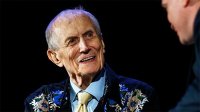 Yevgeny Yevtushenko began to write as a child - his first poems were dedicated to sports and holidays. Works about the problems and experiences of Soviet man began to be published only in the thaw years. In 1961 the poet became famous for the resonant poem "Babi Yar", Dmitry Shostakovich wrote a symphony on its verses. After the collapse of the USSR, Yevtushenko moved to the United States and published a collection of Russian poetry.
Yevgeny Yevtushenko began to write as a child - his first poems were dedicated to sports and holidays. Works about the problems and experiences of Soviet man began to be published only in the thaw years. In 1961 the poet became famous for the resonant poem "Babi Yar", Dmitry Shostakovich wrote a symphony on its verses. After the collapse of the USSR, Yevtushenko moved to the United States and published a collection of Russian poetry.
Yevgeny Yevtushenko was born on July 18, 1932, at the Zima station in the Irkutsk region. His father was Alexander Gangnus, a geologist and amateur poet, and his mother was Zinaida Yevtushenko, a geologist, actress and honored worker of culture of the RSFSR. Thanks to his parents, he fell in love with literature as a child. Yevtushenko recalled: "My father could tell me for hours, even as an unexperienced child, about the fall of Babylon, the Spanish Inquisition, the War of the White and Scarlet Roses, and William of Orange... Thanks to my father, I learned to read and write already at six, and read Dumas, Flaubert, Boccaccio, Cervantes and Wells in droves.
In 1944 his parents divorced, and Yevtushenko moved with his mother to Moscow. There she changed her son's surname to her maiden name. However, they used to see his father: Alexander Gangnus took his son to the evenings of Anna Akhmatova, Boris Pasternak, Mikhail Svetlov, and Alexander Tvardovsky. Also, Yevtushenko was engaged in the poetry studio of the Pioneer House of Dzerzhinsky district, his mother kept all the manuscripts and even sent some poems in letters to his ex-husband. However, the future poet's school marks were poor. And in 1948 he was accused of setting fire to school magazines, and was expelled altogether. Then 15-year-old Yevtushenko went to his father in Kazakhstan: Gangnus was the head of one of the geological exploration expeditions there.
He looked at me, emaciated, torn, and said: "Here's the thing... If you really want to become an independent man, no one must know that I am your father. I became a worker on a geological prospecting expedition. I learned how to chisel the earth with a pickaxe, hammer out samples as flat as the palm of my hand, split the only remaining match into three pieces with a razor, and make a fire when it rained. I returned to my mother tanned and mature. Ripped open my pants, in which was sewn my honestly earned money, and threw them on the table. "How nice that we have money now," my mother said. - We'll finally be able to make repairs to the apartment." "No, Mom," I said firmly. - With this money I'm going to buy myself a typewriter. That typewriter will repair our apartment." And without studying anywhere, I continued frantically writing and bombarding the editors' office with poems again.
Yevgeny Yevtushenko. "Premature Autobiography."
In 1949 Yevtushenko took his poems to the editorial office of the newspaper Soviet Sport. He recalled: "It seems that it was the only newspaper where I had never sent my opuses. Editor Nikolai Tarasov printed the poem "Two Sports", where the poet compared the manners of Soviet and American athletes. Yevtushenko's works began to be published regularly. He wrote poems dedicated to soccer, volleyball, basketball, mountain climbing, rowing, boxing, speed skating. And he created works for national holidays: for the New Year, May Day, Tanker`s Day. This kind of newspaper poetry was popular in those years.
 In 1952, Yevgeny Yevtushenko's first collection "Scouts of the Coming One" was published. He recalled: "I reread the book and suddenly realized with utmost clarity that no one needed it. Who could care about beautiful rhymes and catchy images, if they are only curls around emptiness?" After that, the poet realized that he wanted to write other poems, with deeper meaning. However, thanks to this collection in the same year, he was admitted to the Literary Institute named after A.M. Gorky without school graduation documents. A.M. Gorky Literature Institute. And also - to the Union of Writers, and 20-year-old Yevtushenko became its youngest member.
In 1952, Yevgeny Yevtushenko's first collection "Scouts of the Coming One" was published. He recalled: "I reread the book and suddenly realized with utmost clarity that no one needed it. Who could care about beautiful rhymes and catchy images, if they are only curls around emptiness?" After that, the poet realized that he wanted to write other poems, with deeper meaning. However, thanks to this collection in the same year, he was admitted to the Literary Institute named after A.M. Gorky without school graduation documents. A.M. Gorky Literature Institute. And also - to the Union of Writers, and 20-year-old Yevtushenko became its youngest member.
According to Yevtushenko, in the 1950s there was a demand for "upbeat, forward-calling poems" that supported the idea of a bright communist future. Therefore, his new works about self-doubt and the problems of Soviet people would not be published. However, in 1953 Joseph Stalin died, and the new party leader Nikita Khrushchev relaxed censorship restrictions - a thaw began. And between 1955 and 1957 Yevtushenko published three poetry collections: "The Third Snow", "Highway of Entuziasts", and "The Promise".
However, the poet often missed classes, studied poorly, and in his fourth year was left for a second year. And on March 8, 1957 Yevtushenko was the only one at the plenum of the Moscow Writers' Organization who openly supported the novel "Not by bread alone" by the disgraced poet Vladimir Dudintsev, in which the author criticized the mechanism of running the country and accused officials of bureaucracy. Nikita Khrushchev personally condemned this book, so the act of Yevtushenko was considered an attack against the party line. On the same day he was expelled from the Literature Institute.
In the 1960s he, along with Andrei Voznesensky, Bella Akhmadulina, Robert Rozhdestvensky, Bulat Okudzhava and other poets of the Sixties, performed at the Moscow Polytechnic Museum. Creative evenings gathered many listeners. It was at one of them that Yevtushenko first read his resonant poem "Babi Yar" about how the Nazis massacred Jews during World War II. These events were not discussed publicly and were even kept quiet. The poet recalled: "I had wanted to write poems about anti-Semitism for a long time. But this theme found its poetic solution only when I was in Kiev and saw with my own eyes this terrible place, Babi Yar.
The poem was printed in the Literaturnaya Gazeta, which sold out in newsstands in a single morning, and the poet received letters and telegrams from strangers all over the country.
Yevtushenko covered many problems of Soviet life. For example, in 1962 in the newspaper Pravda he published the poem Heirs of Stalin about how repression affected the country. And three years later the poem "Bratsk Hydroelectric Power Plant" was published. In it the author argued about freedom and the purpose of the Soviet man. The phrase from the introduction - "A poet in Russia is more than a poet" - became a manifesto for Yevtushenko. At the same time he defended Andrei Sinyavsky, Alexander Solzhenitsyn, Joseph Brodsky and other dissident writers, and published extensively in the opposition magazines Yunost, Novy Mir and Znamya. He also criticized the Soviet invasion of Hungary and Czechoslovakia and the war in Afghanistan in the poems "Tanks Going through Prague" and "The Afghan Ant.
Yevtushenko traveled extensively throughout Russia and visited every continent except Antarctica. He described his impressions of his travels in the poems "Kazan University," "Snow in Tokyo," "Ivanovskie sittsy" and "Nepryadva.
In 1959 the writer published his first story - "The Fourth Meshchanskaya", which was devoted to the life of Moscovites during the thaw. Four years later he published another one - "The Chicken God". Then he wrote the novels "Pearl Harbor" and "Ardabiola", and in 1982 - his first novel "Berry places. In it, the events then take place in the 1980s in the taiga prospecting expedition, then moved to the pre-revolutionary Siberia, Petrograd in 1917 and the village of the times of collectivization. So the writer wanted to show that people of different professions, countries and times are connected, they are all part of history and the people. And in 1991 Yevtushenko wrote a political novel "Don't Die Before You Die" about the putsch that took place in August of that year.
In the 1960s, the poet began to collaborate with composers. The poem Babi Yar inspired Dmitri Shostakovich to write the Thirteenth Symphony for soloist, bass chorus and orchestra. The composer also used Yevtushenko's poems "Humor," "In the Store," and "Career" in it, and the poet wrote "Fears" specifically for the symphony. It became world famous and brought the poet worldwide fame. And in 1963, a year after its premiere, Yevtushenko was nominated for the Nobel Prize.
Also, Shostakovich created the rock opera The Execution of Stepan Razin to his lyrics. Yevtushenko worked with other composers: Eduard Kolmanovsky, Yuri Saulsky, Nikita Bogoslovsky, Mikael Tariverdiyev. Songs to his verses were performed by Muslim Magomaev, Sophia Rotaru, Alexander Gradsky, Alla Pugacheva, Alexander Malinin, Igor Talkov and other pop stars. And in 2007 the premiere of the rock opera "White Snows are Coming", written by composer Gleb May to Yevtushenko's lyrics, took place at the Olympiisky Sports Complex.
In co-authorship with the Cuban director Enrique Pineda Barnet in 1964, Yevtushenko wrote the script for Mikhail Kalatozov's film "I am Cuba". In 1979, the poet played a scientist, the founder of theoretical cosmonautics Konstantin Tsiolkovsky in the film "Takeoff" by Savva Kulish. And then Yevtushenko made the films "Kindergarten" and "Stalin's funeral" based on his own scripts and played in them occasional roles.
 Yevtushenko not only wrote, but was also involved in public life. From 1986 to 1991 he was secretary of the Union of Writers of the USSR, then - secretary of the board of the Commonwealth of Writers' Unions. In 1988 the poet joined the human rights society "Memorial", and two years later he became co-chairman of the writer's association in support of perestroika "April". Also, in 1989 Yevtushenko ran for the post of people's deputy of the USSR from the Dzerzhinsky district of Kharkiv-the votes were 74 percent. The poet stayed in this position for a year and a half until the collapse of the USSR in December 1991.
Yevtushenko not only wrote, but was also involved in public life. From 1986 to 1991 he was secretary of the Union of Writers of the USSR, then - secretary of the board of the Commonwealth of Writers' Unions. In 1988 the poet joined the human rights society "Memorial", and two years later he became co-chairman of the writer's association in support of perestroika "April". Also, in 1989 Yevtushenko ran for the post of people's deputy of the USSR from the Dzerzhinsky district of Kharkiv-the votes were 74 percent. The poet stayed in this position for a year and a half until the collapse of the USSR in December 1991.
After this event Yevtushenko signed a contract with an American university in the city of Tulsa and moved with his family to the United States. For the last few years, he lived there and taught courses in Russian poetry, including at King's College in Queens and the University of Pittsburgh. Yevtushenko continued to write and was also a book editor, published articles, and composed radio and television programs. Occasionally the poet visited his homeland and performed at creative evenings. In 2011 he published an anthology in five volumes, The Poet in Russia is More than a Poet. Ten Centuries of Russian Poetry." Yevtushenko built the collection chronologically, from ancient folklore to modern poet Nikolai Glazkov. Its scientific editor was Vladimir Radzishevsky. On July 18, 2010, on his birthday, Yevtushenko opened a museum in Peredelkino near Moscow. There he gathered his personal collection of paintings by Marc Chagall, Pablo Picasso, Max Ernst and other famous artists, many of whom gave him their canvases themselves. Yevgeny Yevtushenko willed the gallery to the state.
On March 12, 2017, the poet was hospitalized in the United States: he had been seriously ill for the past years. Yevgeny Yevtushenko died April 1, 2017, in his sleep from cardiac arrest surrounded by his family at Hillcrest Medical Center in Tulsa. According to his last will, he was buried at Peredelkino Cemetery next to poets Boris Pasternak and Viktor Bokov.


